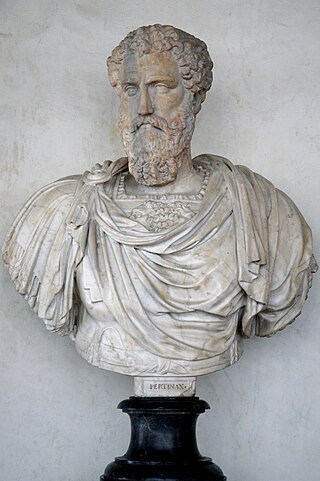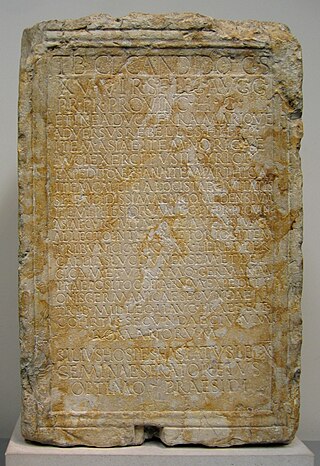Related Research Articles
The 190s decade ran from January 1, 190, to December 31, 199.

Year 193 (CXCIII) was a common year starting on Monday of the Julian calendar. At the time, it was known as the Year of the Consulship of Sosius and Ericius. The denomination 193 for this year has been used since the early medieval period, when the Anno Domini calendar era became the prevalent method in Europe for naming years.
Year 197 (CXCVII) was a common year starting on Saturday of the Julian calendar. At the time, it was known as the Year of the Consulship of Magius and Rufinus. The denomination 197 for this year has been used since the early medieval period, when the Anno Domini calendar era became the prevalent method in Europe for naming years.

Publius Helvius Pertinax was Roman emperor for the first three months of 193. He succeeded Commodus to become the first emperor during the tumultuous Year of the Five Emperors.

Marcus Didius Julianus was Roman emperor from March to June 193, during the Year of the Five Emperors. Julianus had a promising political career, governing several provinces, including Dalmatia and Germania Inferior, and defeated the Chauci and Chatti, two invading Germanic tribes. He was even appointed to the consulship in 175 along with Pertinax as a reward, before being demoted by Commodus. After this demotion, his early, promising political career languished.

Decimus Clodius Albinus was a Roman imperial pretender between 193 and 197. He was proclaimed emperor by the legions in Britain and Hispania after the murder of Pertinax in 193. Initially Albinus cooperated with another contender for the throne, Septimius Severus, but the two turned on each other in 196 and commenced a civil war. Albinus died in battle the following year.

The Year of the Five Emperors was AD 193, in which five men claimed the title of Roman emperor: Pertinax, Didius Julianus, Pescennius Niger, Clodius Albinus, and Septimius Severus. This year started a period of civil war when multiple rulers vied for the chance to become emperor.
Quintus Aemilius Laetus was a prefect of the Roman imperial bodyguard, known as the Praetorian Guard, from 191 until his death in 193. He acceded to this position upon the deaths of his predecessors Regillus and Lucius Julius Vehilius Gratus Julianus, by appointment of emperor Commodus. His name suggests that his family received Roman citizenship from Marcus Aemilius Lepidus.
Tiberius Claudius Severus Proculus was a Roman Senator. Via his mother he was a grandson of Emperor Marcus Aurelius, but he played only a limited role in dynastic politics.
Titus Flavius Claudius Sulpicianus was a Roman statesman who served as Senator and Consul suffectus. He unsuccessfully attempted to succeed his son-in-law Pertinax as Emperor in 193.
Gaius Pomponius Bassus Terentianus was a Roman military officer and senator.
Quintus Hedius Rufus Lollianus Gentianus was a Roman military officer and senator who was appointed consul suffectus in around AD 186–188.
Gaius Caesonius Macer Rufinianus was a Roman military officer and senator who was appointed suffect consul in around AD 197 or 198. He was the first member of gens Caesonia to hold a consulship.
The gens Erucia was a plebeian family at Rome. Members of this gens are first mentioned early in the first century BC; the name has been claimed as Etruscan. However, in the second century of the Empire, the Erucii attained considerable distinction.
Quintus Pompeius Sosius Falco was a Roman senator, who was active during the reign of Commodus. He was consul ordinarius in 193 with Gaius Julius Erucius Clarus Vibianus as his colleague.

The gens Sosia, occasionally written Sossia, was a plebeian family at ancient Rome. Members of this gens occur in history from the end of the Republic down to the third century AD. The first of the Sosii to attain the consulship was Gaius Sosius in 32 BC, and the family would continue holding various positions in the Roman state until the third century.

Tiberius Claudius Candidus was a Roman general and senator. He played an important role supporting Septimius Severus in the struggle for succession following the assassination of the emperor Pertinax in 193 CE.
Triarius Maternus, otherwise known as Triarius Maternus Lascivius was a Roman Senator who was consul ordinarius in 185 CE with Atticus Bradua as his colleague.

The gens Triaria was an obscure plebeian family at ancient Rome. Only a few members of this gens are mentioned by Roman writers, but two of them attained the consulship in imperial times. Other Triarii are known from inscriptions.
References
- ↑ Champlin, pg. 298
- ↑ Cassius Dio lxxiv. 9, 5–6.
- ↑ Champlin, pg. 300